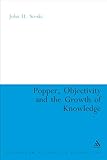Popper,objectivity and the growth of knowledge/ John H. Scieski
Material type: TextPublication details: London: Continuum press, 2007Description: xiii, 159 pISBN: 9780826489043Subject(s): (not yet rated) 0 with reviews - Be the first. Subjects Objectivity. Science -- Methodology. CosmologyDDC classification: 192
TextPublication details: London: Continuum press, 2007Description: xiii, 159 pISBN: 9780826489043Subject(s): (not yet rated) 0 with reviews - Be the first. Subjects Objectivity. Science -- Methodology. CosmologyDDC classification: 192 | Item type | Current library | Call number | Status | Date due | Barcode | Item holds |
|---|---|---|---|---|---|---|
|
|
Central Library, Sikkim University General Book Section | 192 SCI/P (Browse shelf(Opens below)) | Available | P10025 |
Browsing Central Library, Sikkim University shelves, Shelving location: General Book Section Close shelf browser (Hides shelf browser)

|

|
No cover image available |

|

|

|

|
||
| 192 NAS/B Bertrand russell and the edwardian philosopher: constructing the world/ | 192 RUS/P Philosophical essays/ | 192 RUS/P Philosophical essays/ | 192 SCI/P Popper,objectivity and the growth of knowledge/ | 192 WIN/T The Cambridge companion to Berkeley/ | 193 ALL/R Reading the new Nietzsche/ | 193 CER/H Heidegger/ |
1. Introduction: Overview of the Argument
1. Problems of Philosophical Problem Solving:
An Apologetic Beginning
2. Overview of Popper's Solution to the Problem of Objectivity
3. Comments on the Problem Situation
3.1. The Epistemological Problem
3.2. The Metaphysical Problem
3.3. The Linguistic Problem
3.4. The Political Problem
3.5. The Ethical Problem
2. Scientific Method and Objectivity
Introduction
1. Popper's Solution to the Problem of Demarcation
1.1. The General Logical Context
1.2. Empirical Refutability
a. Strictures on Scientific Testing
a. 1. Intersubjectivity and Repeatability
a.2. Theory-ladenness and Conceiveability
1.3. Consideration of Criticisms
a. Asymmetry
b. Empirical Basis
c. Repeatability
d. Kripke and Intersubjectivity
2. The Problem of I nduction
2.1. The Solution: Conjectural Knowledge
2.2. The Four Interrelated Problems of Induction
a. The Logical Problem
b. The Epistemological Problem
1
c. The Methodological Problem
d. The Metaphysical Problem; The Unifying
Aspect of Popper's Theory of Objectivity
e. Popper's Solution to the Metaphysical Problem
3. Corollaries: Corroboration, Truth, and Verisimilitude
3.1. Corroboration
3.2. Truth
3.3. Verisimilitude
3. Cosmology and Propensities
Introduction
1. Popper's Account of Propensities
1.1. Physical Propensities, Probability, and Tests
a. Popper's Early Treatment of Probability
b. Von Mises' Frequency Interpretation
c. Popper's Frequency Theory of Probability
d. The Propensity Theory of Probability
2. Evolutionary Epistemology
2.1. Neo-Darwinian Evolution: A Standard Account
2.2. The Logic of Evolution and Critical Rationalism
a. No Guarantee
b. Growth by Criticism
c. Neo-Darwinism and Criticizability
d. Historicity
e. Organisms are Problem Solvers
f. Genetic Basis
g. Situational Logic
h. Background Knowledge
3. The Fundamental Difference: Towards an Evolutionary
Ontolog\
3.1. An Evolutionary Ontology
a. World Three and Its Interactions
b. The Objectivity of World Three
c. Objective Propensities Concurrent with Language
d. Propensities and Products
4. An Objective Social Order: Politics and Ethics
Introduction
1 Evolution and the Myth of the Framework
2. Social Science Methodology
3. Historicism
4. Ethics


There are no comments on this title.